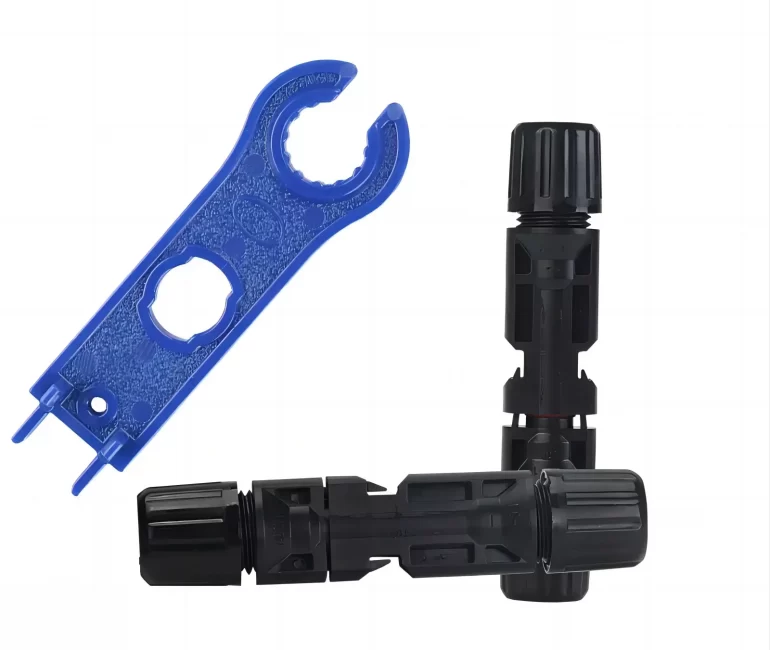Table of Contents
ToggleWhat Is Mc4 Connector?
Introduction
In the realm of solar energy, efficiency, and dependability are crucial to a system’s overall performance. The solar connector is an essential component that plays a significant role in ensuring the efficient transfer of energy. Today, we will explore the world of MC4 connectors, including their history, components, and benefits.
“Moreday Places A Premium On The Quality Of The Mc4 Connector Because It Affects The Security Of The Entire Solar System.”Suki Shi Moreday manager
What Is An Mc4 Connector?
An MC4 (multi-contact, 4mm) connector is a standardized, single-contact electrical connector used in the solar industry to connect solar panels and other components within a photovoltaic (PV) system. These connectors enable efficient and safe electricity transfer between solar panels, inverters, and other PV components, ensuring optimal solar installation performance.
Source: MOREDAY
History Of Mc4 Connectors
MC4 connectors were created by the Swiss firm Multi-Contact, which is now a division of Staubli Electrical Connectors. Due to their usability, dependability, and weather resistance, these connectors quickly gained popularity. Today, MC4 connectors are the worldwide industry standard for solar installation.
Components Of Mc4 Connectors
Male And Female Connectors
MC4 connectors have both male and female connectors, ensuring a secure connection that prevents unintentional disconnection. Typically, the male connector is connected to the positive wire, and the female connector is connected to the negative wire.
Mc4 Connector Housing
The MC4 connector housing is made from UV-resistant, durable plastic that shields the metal contacts from environmental elements. This housing guarantees that the connectors are weatherproof and able to withstand harsh conditions.
Source: MOREDAY
Mc4 Connector Terminal
The terminal of the MC4 connector is a metal contact that securely connects the solar cable to the connector housing. The typical composition of these terminals is tin-plated copper, which provides excellent conductivity and corrosion resistance.
Source: MOREDAY
Importance Of Mc4 Connectors
MC4 connectors are essential to the safety and performance of a solar power system. They enable quick and secure connections between solar panels and other system components, minimizing energy losses and ensuring optimal system performance. In addition, their weatherproof design protects the electrical connections from environmental factors, extending the life of the solar installation.
Benefits Of Mc4 Connectors
Ease Of Use
Installation of MC4 connectors is designed to be rapid and straightforward. Their male and female components connect securely without the need for specialized tools.
Source: MOREDAY
High Reliability
MC4 connectors have a reputation for dependability. Solar installations with a secure connection and long-lasting materials ensure long-lasting performance and minimal energy loss.
Weather Resistance
One of the most significant benefits of MC4 connectors is their resistance to harsh environmental conditions. The UV-resistant plastic housing and tin-plated copper terminals offer superior resistance to corrosion and other weather-related factors, making them suitable for outdoor solar installations.
Source: MOREDAY
Mc4 Connector Standards
Multiple international standards govern the use of MC4 connectors, guaranteeing their safety and dependability in solar installations:
IEC 62852
Standard 62852 of the International Electrotechnical Commission (IEC) outlines the requirements for photovoltaic system connectors. These specifications are met by MC4 connectors, ensuring their compatibility with a vast selection of solar components.
UL 6703
Standard 6703 from Underwriters Laboratories (UL) outlines the safety requirements for PV connectors in North America. MC4 connectors meeting this standard have been tested and approved for safe use in solar installations.
How To Install Mc4 Connectors?
Step 1: Gather Required Tools
You will need a wire stripper, an MC4 crimping tool, and a pair of pliers to install MC4 connectors.
Step 2: Strip The Solar Cable
Using the wire stripper, remove the insulation from the end of the solar cable.
Step 3: Assemble The Connector
Slide the MC4 connector housing onto the solar cable that has been stripped.
Step 4: Crimp The Terminal
Insert the stripped end of the solar cable into the appropriate terminal (male or female) and crimp the terminal to the cable using the MC4 crimping tool.
Step 5: Insert The Terminal Into The Housing
Insert the crimped terminal until it clicks into place within the MC4 connector housing.
Step 6: Connect The Male And Female Mc4
After ensuring that the notches on the male and female MC4 connectors are aligned, push the connectors together until you hear a secure click.
Common Mc4 Connector Issues
Loose Connections
Loss of energy and a possible risk to one’s safety may be the result of connections that are too loose. In order to prevent these problems from occurring, make sure that the MC4 connectors are properly connected and locked into place.
Corrosion
The MC4 connector terminals are susceptible to corrosion if they are exposed to harsh environmental conditions. Maintain a regular inspection schedule for the connectors to look for any signs of corrosion and replace any that show up.
Improper Crimping
Poor electrical connections and wasted energy may be the result of terminals that have not been correctly crimped. When you are installing MC4 connectors, you need to ensure that you use the correct crimping tool and that you do it in the correct manner.
Tips For Troubleshooting Mc4 Connectors
Visual Inspection
Conduct routine inspections to look for signs of wear, damage, or corrosion in your MC4 connectors. If you want your solar installation to perform at its best, you need to address any problems as soon as possible.
Check For Proper Seating
Check to ensure that the terminals are seated correctly inside the MC4 connector housing. If the connector is not properly seated, you will need to disassemble it and re-insert the terminal while making sure it clicks into place.
Tighten Connections
Loss of energy and even a risk to one’s safety might result from connections that are too loose. Check the tightness of your MC4 connectors and secure them if necessary. Make sure to check the tightness of your MC4 connectors.
Clean Corroded Terminals
If you find that the terminals of the MC4 connector have become corroded, you should clean them using a soft brush and contact cleaner. If the corrosion is extensive or if it is affecting performance, the connectors will need to be replaced.
Re-crimp Improperly Crimped Terminals
During your inspection, if you discover that any of the terminals have been crimped incorrectly, you will need to carefully remove the terminal from the MC4 connector housing and then re-crimp it using the appropriate tool and method.
MC4 Connector Accessories
It is possible to improve functionality and ease of use in solar installations with the help of a number of different accessories that are available for MC4 connectors. These accessories include:
MC4 Branch Connectors
The use of MC4 branch connectors, which are also referred to as Y connectors, enables you to connect many solar panels in parallel, which both simplifies the process of wiring and reduces the amount of cable clutter that is present.

Source: MOREDAY
MC4 Extension Cables
A MC4 extension cable is a pre-assembled cable that has MC4 connectors on both ends. They provide a convenient way to extend the reach of the wiring for your solar panel system.
MC4 Disconnect Tools
MC4 disconnect tools are specifically designed to assist you in disconnecting MC4 connectors in a manner that is both safe and straightforward, without causing any damage to the connectors or wiring.
Source: MOREDAY
Alternatives To Mc4 Connectors
Although MC4 connectors are considered the industry standard for solar installations, there are other types of connectors that can be purchased on the market.
Anderson Connectors
Connectors manufactured by Anderson, often referred to as Anderson power poles, are adaptable and widely used in a variety of applications, including solar power systems. They come in a variety of sizes and may be configured in a number of different ways. Their design is straightforward and modular.
Tyco Solarlok
Tyco Solarlok connectors, which were developed by TE Connectivity, provide features comparable to those found in MC4 connectors. These features include resistance to adverse weather conditions and secure connections. They are suitable for use with a wide variety of photovoltaic components, and on occasion, they are substituted with MC4 connectors.
Amphenol H4 Connectors
Connectors made by Amphenol called h4 provide compatibility with connectors made by MC4 and have performance characteristics that are comparable to those of h4 connectors. These connectors may be used in solar installations. They have been examined for durability and resistance to the effects of the elements, and their design makes them simple to put together and take apart.
Conclusion
In order to provide safe and effective electrical connections between solar panels and other photovoltaic (PV) components, solar installers rely on MC4 connectors, which are an essential component of solar installations. Because of their user-friendliness, dependability, and resistance to the effects of the elements, they have become the standard in the solar connector industry. The optimal performance of your solar power system may be ensured by ensuring that it was installed correctly, that it is regularly maintained, and that compatible accessories are used.
Derek Ke
Hey, I’m Derek Ke, the founder of Moredaydc.com, an expert in solar electrical products and ev charging.
In the past 15 years, we have helped 60 countries and nearly 500 customers (such as farms, residences, industrial and commercial) solve new energy and green power problems. This article aims to share more knowledge about solar electricity and new energy with everyone, so that green electricity can enter every home.
Common Queries
Frequently Asked Questions
A1: Yes, MC4 connectors are compatible with a wide range of solar panel brands and are considered the industry standard for solar installations.
A2: Genuine MC4 connectors will have the manufacturer’s logo (stäubli or multi-contact) and relevant certification marks (e.g., tuv, ul) on the connector housing.
A3: Yes, MC4 connectors are designed to be weather-resistant and can withstand exposure to rain and moisture.
A4: It is not recommended to connect or disconnect MC4 connectors while the solar panels are live. Doing so can result in dangerous electrical arcs and potential damage to the connectors or other components.
A5: It’s a good practice to inspect your MC4 connectors at least once a year, checking for signs of wear, damage, or corrosion. However, the frequency of inspections may vary depending on the environmental conditions in your area. In harsher environments, more frequent inspections are recommended to ensure the optimal performance of your solar installation.
A6: MC4 connectors are designed to be used with compatible MC4 connectors. While they may physically fit with some other connector types, doing so is not recommended and can result in poor connections or damage to the connectors.
A7: Standard MC4 connectors are rated to handle currents up to 30 amps. However, some specialized MC4 connectors can handle higher currents, depending on their specific design and application.
A8: While it is possible to disconnect MC4 connectors without a specialized tool, using an MC4 disconnect tool is recommended. These tools are designed to safely and easily disconnect the connectors without causing damage.
A9: In general, MC4 connectors are designed for long-lasting performance and can be reused if they are in good condition. However, if a connector shows signs of wear, damage, or corrosion, it should be replaced to ensure a reliable connection.
A10: Regular maintenance and inspection of your MC4 connectors can help prevent corrosion. If you notice any signs of corrosion, clean the terminals using a soft brush and contact cleaner. In addition, using dielectric grease on the terminals can help protect them from moisture and corrosion.
Make Electricity Available To All People








